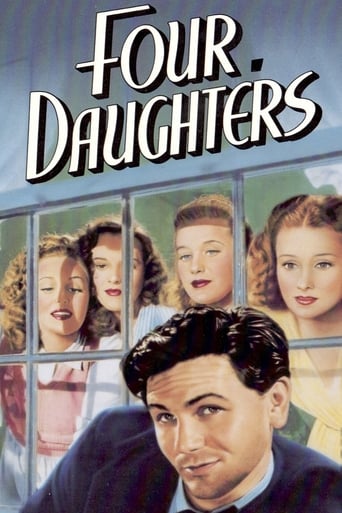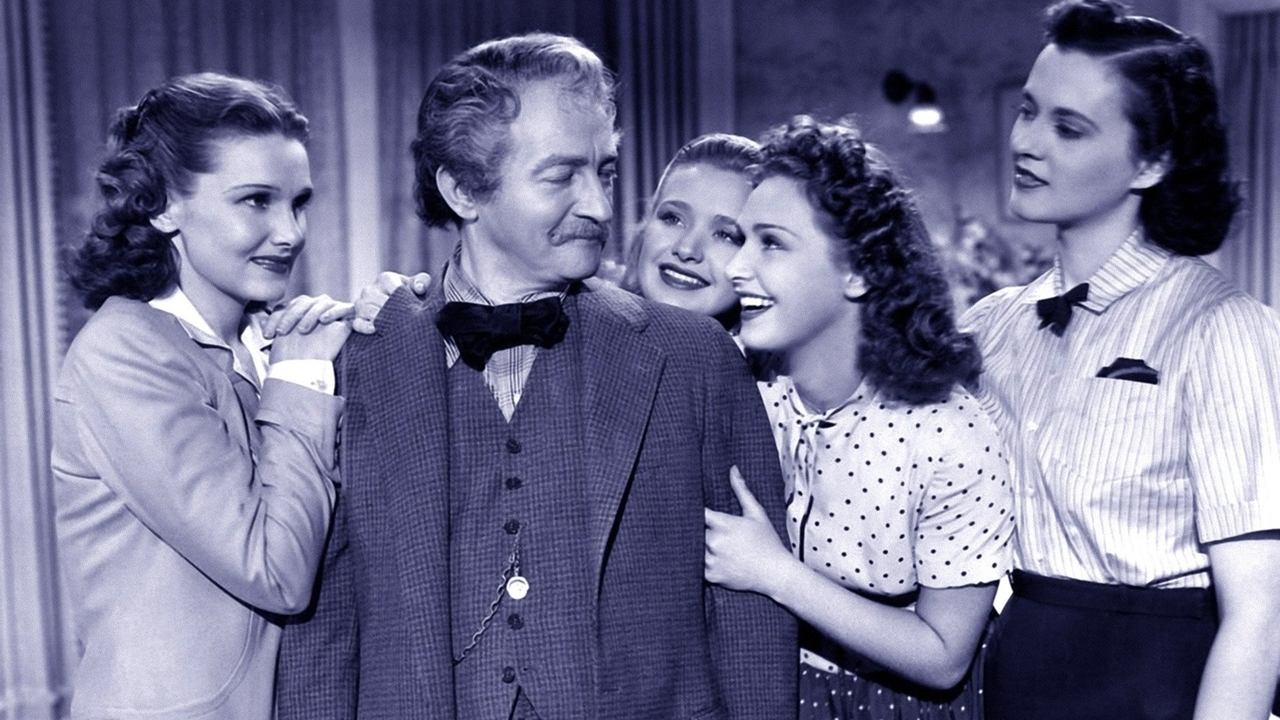dougdoepke
No need to recap the plot.Thanks to some fairly gritty touches, the movie manages to avoid the sappy pitfalls of most soapers. Good touch making Dad (Rains) a likable curmudgeon, plus a sneaky Aunt Etta (Robson) who can out-cranky him one-on-one. Then, of course, there's the star-crossed Mickey (Garfield), a street tough musician and ethnic type, who sticks out in the whitebread family like the proverbial onion in a petunia patch. Together, these touches manage to keep the bubbly household from floating away. Naturally, with four lovely girls animating the family, there're bound to be romantic entanglements, which, of course, make up the plot. I'm glad Ann (Priscilla) has blonde hair because I was having real trouble telling the three brunettes apart. Priscilla Lane really registers, along with Garfield in his first, break-out, role. He also shows more self-doubt than maybe any other time in a storied career. Also, I agree that Jeffrey Lynn is livelier than usual and does well as the handsome swain. Too bad we don't see more of the other three sisters as individuals instead of part of the supporting chorus.All in all, however, it's really director Curtiz who keeps the sentimental package from unraveling. At no point does he milk the emotional scenes, ever a temptation for this type material. So what we come away with is the charm of an ideal family without the usual cloy-- no mean accomplishment. Of course, it also helps to have a squeaky swinging gate somewhere in the background.(In Passing-- note how the spread of radio is used as the hallmark of a generational shift. The girls like swing music as much as the classics, much to Dad's chagrin. Then too, why make your own parlor room music when the radio is as easy as an "On" button. I guess TV was not the first electronic device to re-orient family life.)
liehtzu
At the end of this one, the debut of John Garfield, directed by the great, underrated Michael Curtiz, I felt real irritation and loathing. It's a frustrating, maddening movie. A music teacher (Claude Rains) is the father of four spoiled little princesses who all play musical instruments, but who read movie gossip magazines and would rather play jazz music during every Beethoven session. One of the girls is early on in the picture married to a bumbling middle-aged fellow who she treats with gentle condescension, but he was worth marrying because he's wealthy. The two other sisters are the best of friends and make a vow that neither of them will ever marry, so that they can be together always. Of these two the elder has a boyfriend, but doesn't think terribly much of him. The youngest sister (Priscilla Lane) is the only blonde of the bunch and is the female star of the film. There's a final sister who remains a curious nonentity throughout and never has any romantic interests, so for all practical purposes there are only three sisters. So: Into their lives steps a handsome young dandy who is a composer of "modern" music and professes his disdain of Beethoven to Father. Even though Father disagrees with the young fellow's views, he's a generous old chap and allows him to board in the big house so that he can finish his prize entry composition on the grand piano. The girls are all quite taken with the young man: Isn't he dreamy? The composer has a pal, a down-on-his-luck working-class guy, John Garfield, who's far more talented than the composer but has had a lifetime of bad breaks and is very much rough around the edges. He enjoys nothing more than recounting his bad breaks and bemoaning the unlucky star he was born beneath. The composer hires him to "help" with the composition, but one gets the impression that Garfield writes the better part of it. Garfield falls for the youngest sister, because, though she's a spoiled little modern girl she's the only one who shows him much kindness. But the composer asks her to marry him and she, all in a swoon, immediately says yes. However, on the eve of the wedding the girl realizes that her best-friend-sister has secretly "loved" the composer all the while and, in a gesture of self-sacrificing nobility, leaves him at the alter and marries Garfield, who she doesn't love. However - and this is the truly hilarious bit - it turns out that the best-friend-sister realizes all of a sudden that the old boyfriend who she never thought terribly much of is the guy she "really" loves, and, the composer forgotten, marries him. The composer, dejected, moves far away. Fortunately Garfield, married to a girl he knows doesn't love him, and financially exhausted, kills himself in a car on an icy road. The composer comes back to town, meets the youngest sister, now happily single, and they're all smiles, smiles.The girls are all no doubt supposed to be "charming," as is the composer. But they mostly strike one as a rather repugnant, narcissistic lot. The only real sympathetic character in the film is Garfield's character, who has endless bad luck and has to die so that the two vain little bunnies can rekindle their romance before the end credits. But after I turned the movie off, it occurred to me that this is what the attentive viewer is SUPPOSED to think. For the popcorn-chomping non-thinkers in the audience - the target audience - it is a nice little movie about four "charming" sisters and their romantic lives, all shot in the pleasant, anonymous style that would years later become the standard for TV sitcoms. But there are enough hints of what socially-conscious director Curtiz really felt about the scenario, enough seemingly throw-away lines of dialogue; there's enough wretchedness and anger in John Garfield's character (who feels like he's from a different movie) to hint at the film's deeper interests. The sisters and the composer are monsters, the kind of dim-witted, unfeeling people with money and "charm" that keep a guy from Garfield's class in his place, no matter how much talent he may have, by either ignoring him (the sisters) or exploiting him for their own ends (the composer, off to glorious career on Garfield's back). The movie's brilliance is in its quietly subversive intentions.
tjonasgreen
It isn't hard to see why frequent moviegoers in 1938, wise to the formulas of most movies, would have found FOUR DAUGHTERS a fresh and surprising picture. The story of four musical sisters and their romantic problems begins as conventionally as any Deanna Durbin musical but quickly evolves into an absorbing romantic melodrama.Director Michael Curtiz keeps all four actresses bubbling sweetly and predictably, but when Jeffrey Lynn enters the picture trouble begins. Though one sister is engaged and another nearly so, all four in some way become smitten by this young musician. Then the script tops itself (and electrified audiences) by introducing a further complication named John Garfield. Cynical, depressive, darkly attractive and clearly a New York 'ethnic' type, Garfield is in every way the opposite of tall, handsome, WASPy Jeffrey Lynn, who in any other picture would probably have made more of an impression. Though friends, the men vie for Priscilla Lane, whose unaffected acting style creates a nice tension with both actors. Believing it best for her sister, Priscilla marries the wrong man, at once confounding and satisfying audience expectations. Halfway through this film you are apt to wonder what will happen next and how events will play out, which is not what you expect from the sunny opening.Garfield's success overshadowed every other good thing about this film. Clearly Warners' thought they had a successor to Jimmy Cagney. In fact they had the forerunner of Robert Mitchum, Robert Ryan, Montgomery Clift, Brando and James Dean, though Garfield was warmer and more likable than any of those. This movie was remade in 1955 as a Technicolor musical called YOUNG AT HEART starring Doris Day and Frank Sinatra. Though not a bad idea in theory, the original is a better film.
jimi99
It's not hard to see why this powerful introduction to the public of one of the iconic film stars was so sensational. Not unlike Brando in Streetcar, except that the material is quite sentimental and makes Garfield's performance seem even that much edgier and magnetic. Not that this is a Life With Father With Angry Young Man, the script is intelligent and the conflicts believable. Priscilla Lane is wonderfully naturalistic as the youngest daughter with 2 men in love with her, including Garfield's Mickey Borden. And as always, Claude Rains' performance as the widower father and May Robson's as the live-in Aunt Etta, are fine and provide a lot of humor. The movie does have both a light and a heavy touch, intermingled deftly. Probably deserving of the Oscar nominations it received for 1938, but not of two sequels...


 AD
AD



